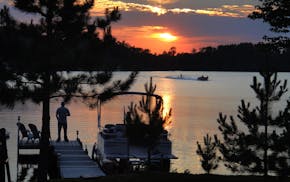In Minnesota, people love their cabins.
The experiences and memories our cabins give us are irreplaceable. Wellies and rain suits, hanging by the shore looking for frogs, watching fireworks over the lake on the Fourth of July, driving slowly at night, hoping to spot deer, fires in the fire pit and games on the porch.
And then our kids get older, with sports and activities occupying their weekends. Maybe we eventually decide to sell the cabin. There are wonderful family reasons to own a vacation home, but how do you evaluate it as an investment?
Most of us don't consider all the costs of owning vacation homes, both in time and money. Here is how to plan for ownership of a second home:
There are obvious costs, such as insurance, property taxes and utilities. Property taxes and insurance conservatively each cost around 1% of the home's appraised value. We have seen insurance costs increase significantly through the past few years. Depending on where your vacation home is, it might even be unobtainable. But more importantly, insurance costs are rising because the likelihood of claims are rising. Your deductible might be a hidden cost of owning your vacation home.
Next, you have to put money down on your property. The money you put down could be earning returns elsewhere. If you were in a money market fund, you would be earning around 4%. If you paid all cash for the property, it would cost you a minimum of 6% a year (opportunity cost, taxes and insurance) of your home's value, plus utilities. If you put 20% down and had a 6% mortgage, your annual costs would be more than 7.5%.
But what about upkeep? Depending on the age and complexity of the home, generally, upkeep would annually be around 1% to 2% of a home's value. And this is if you do all the chores yourself. Any big expense would be on top of this.
Then there are all the toys you "need" when you buy the vacation property, as well as your furnishing costs. These expenses will vary based on your personality.
To put it in dollars, your annual cost of owning a $400,000 vacation home would be more than $30,000 a year. The question to ask yourself is, "How do I want to spend my $30,000 a year vacation budget?" Would you be just as happy renting places and boats or traveling with the family?
What about tax savings? Ah, they are far more elusive than they used to be. Unless you have significant mortgage interest and charitable deductions already, you might not receive a full benefit from itemizing because the standard deduction is so high, and there are mortgage and property tax deduction limitations.
Depending on what and where you buy, vacation homes could appreciate in time. But money invested could also provide returns greater than the 4% opportunity costs illustrated.
Given these numbers, here are the key considerations on whether to own vacation home:
Consider owning:
- If you have a lot of flexibility with your work and want to come and go as you please.
- If you have a deep need to be planted in a community.
- If you have significant discretionary income.
- If you have constraints that make renting difficult.
- If you intend to use it 75 days or more a year.
- If your personality would view your vacation budget differently from your ownership budget.
Don't buy:
- If you are just trying to get a foothold someplace but don't plan on using it often.
- If you haven't explored a variety of areas to see where would be your best fit.
- If you don't have sufficient assets to pay for the unexpected.
- If you like variety in your experiences.
- If you can view rentals as experiments rather than as good or bad.
- If you don't enjoy keeping up two places and don't have the resources to hire things out.
Owning a vacation home can be a wonderful thing, but it can also be more than you bargained for. Thoroughly explore your options.
Ross Levin is the founder of Accredited Investors Wealth Management in Edina. He can be reached at ross@accredited.com.

Ramstad: New U.S. Bank CEO impresses with dedication to 'keep the mission, pick up the pace'
Department of Government Efficiency causing confusion about when to claim Social Security

How to know if buying a vacation home is right for you

